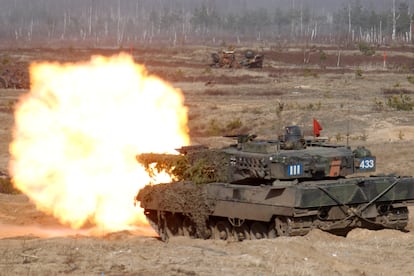After US offer, Germany releases Leopard tanks for Ukraine
Kremlin spokesman Dmitry Peskov described German and US intentions as ‘a rather disastrous plan’

After weeks of hesitation that saw growing impatience among Germany’s allies, Chancellor Olaf Scholz announced Wednesday that his government would provide Ukraine with Leopard 2 battle tanks and approve requests by other countries to do the same.
In a statement, the German government said it would initially provide Ukraine with one company of Leopard 2 A6 tanks, which comprises 14 vehicles, from its own stocks. The goal is for Germany and its allies to provide Ukraine with a total of two battalions, or 88 tanks.
“This decision follows our well-known line of supporting Ukraine to the best of our ability,” Scholz said after a Cabinet meeting in Berlin.
Germany was “acting in close coordination” with its international allies, he added.
The long-awaited decision came after US officials said a preliminary agreement had been struck for the United States to send M1 Abrams tanks to help Kyiv push back Russian forces entrenched in the east almost a year since the start of the war.
Scholz had insisted that any move to provide Ukraine with powerful Leopard 2 tanks would need to be closely coordinated with Germany’s allies, chiefly the United States. By getting Washington to commit some of its own tanks Berlin hopes to spread the risk of any backlash from Russia.
Ekkehard Brose, head of the German military’s Federal Academy for Security Policy, said tying the United States into the decision was crucial, to avoid Europe facing a nuclear-armed Russia alone.
But he also noted the deeper historic significance of the decision.
“German-made tanks will face off against Russian tanks in Ukraine once more,” he said, adding that this was “not an easy thought” for Germany, which takes its responsibility for the horrors of World War II seriously.
“And yet it is the right decision,” Brose said, arguing that it was up to Western democracies to help Ukraine stop Russia’s military campaign.
Kremlin spokesman Dmitry Peskov described German and US intentions with the tanks as a “a rather disastrous plan.”
“I am convinced that many specialists understand the absurdity of this idea,” Peskov told reporters Wednesday.
“Simply because of technological aspects, this is a rather disastrous plan. The main thing is, this is a completely obvious overestimation of the potential (the supply of tanks) would add to the armed forces of Ukraine. It is yet another fallacy, a rather profound one,” the Kremlin official said.
Peskov predicted “these tanks will burn down just like all the other ones. ... Except they cost a lot, and this will fall on the shoulders of European taxpayers.” he added.
Members of Scholz’s three-party coalition government welcomed the news ahead of the official announcement, expected in a speech to parliament early afternoon.
“The Leopard’s freed!” said German lawmaker Katrin Goering-Eckardt, a senior Green party lawmaker.
Marie-Agnes Strack-Zimmermann, a member of the Free Democratic Party who chairs the parliamentary defense committee, said the news was “a relief for a mistreated and brave Ukraine.”
“The decision to approve (other countries’ requests) and supply the Leopard 2 was arduous, but unavoidable,” she said.
Strack-Zimmermann had been one of the loudest voices calling for a swift decision on arms supplies to Ukraine.
Two smaller opposition parties criticized the move, however.
The far-right Alternative for Germany called the decision “irresponsible and dangerous.”
“Germany risks being drawn directly into the war as a result,” its co-leader, Tino Chrupalla, said. The party, known by its acronym AfD, has friendly ties to Russia.
The Left party, which also has historic links to Moscow, warned of a possible escalation in the conflict.
“The supply of Leopard battle tanks, which ends a further taboo, potentially takes us closer to a third world war than in the direction of peace in Europe,” the party’s parliamentary leader, Dietmar Bartsch, told German news agency dpa.
Recent opinion polls show German voters split on the idea.
The pressure on Scholz mounted this week after Poland formally asked Germany to approve sending Leopard 2 tanks from Polish stocks to Ukraine.
Prime Minister Mateusz Morawiecki of Poland, which was among the countries leading the call for Western allies to send tanks to Germany, thanked Scholz following Wednesday’s announcement.
“The decision to send Leopards to Ukraine is a big step towards stopping Russia,” he wrote on Twitter. “Together we are stronger.”
Other European nations have also indicated a willingness to part with their own Leopard or similar battle tanks as part of a larger coalition.
Still Ukraine’s President Volodymyr Zelenskiy made clear late Tuesday that he hoped to receive a more substantial number of tanks from western allies.
“It is not about five, or 10, or 15 tanks. The need is greater,” he said.
The German government said it planned to swiftly begin training Ukrainian tank crews in Germany. The package being put together would also include logistics, ammunition and maintenance.
Sign up for our weekly newsletter to get more English-language news coverage from EL PAÍS USA Edition
Tu suscripción se está usando en otro dispositivo
¿Quieres añadir otro usuario a tu suscripción?
Si continúas leyendo en este dispositivo, no se podrá leer en el otro.
FlechaTu suscripción se está usando en otro dispositivo y solo puedes acceder a EL PAÍS desde un dispositivo a la vez.
Si quieres compartir tu cuenta, cambia tu suscripción a la modalidad Premium, así podrás añadir otro usuario. Cada uno accederá con su propia cuenta de email, lo que os permitirá personalizar vuestra experiencia en EL PAÍS.
¿Tienes una suscripción de empresa? Accede aquí para contratar más cuentas.
En el caso de no saber quién está usando tu cuenta, te recomendamos cambiar tu contraseña aquí.
Si decides continuar compartiendo tu cuenta, este mensaje se mostrará en tu dispositivo y en el de la otra persona que está usando tu cuenta de forma indefinida, afectando a tu experiencia de lectura. Puedes consultar aquí los términos y condiciones de la suscripción digital.








































